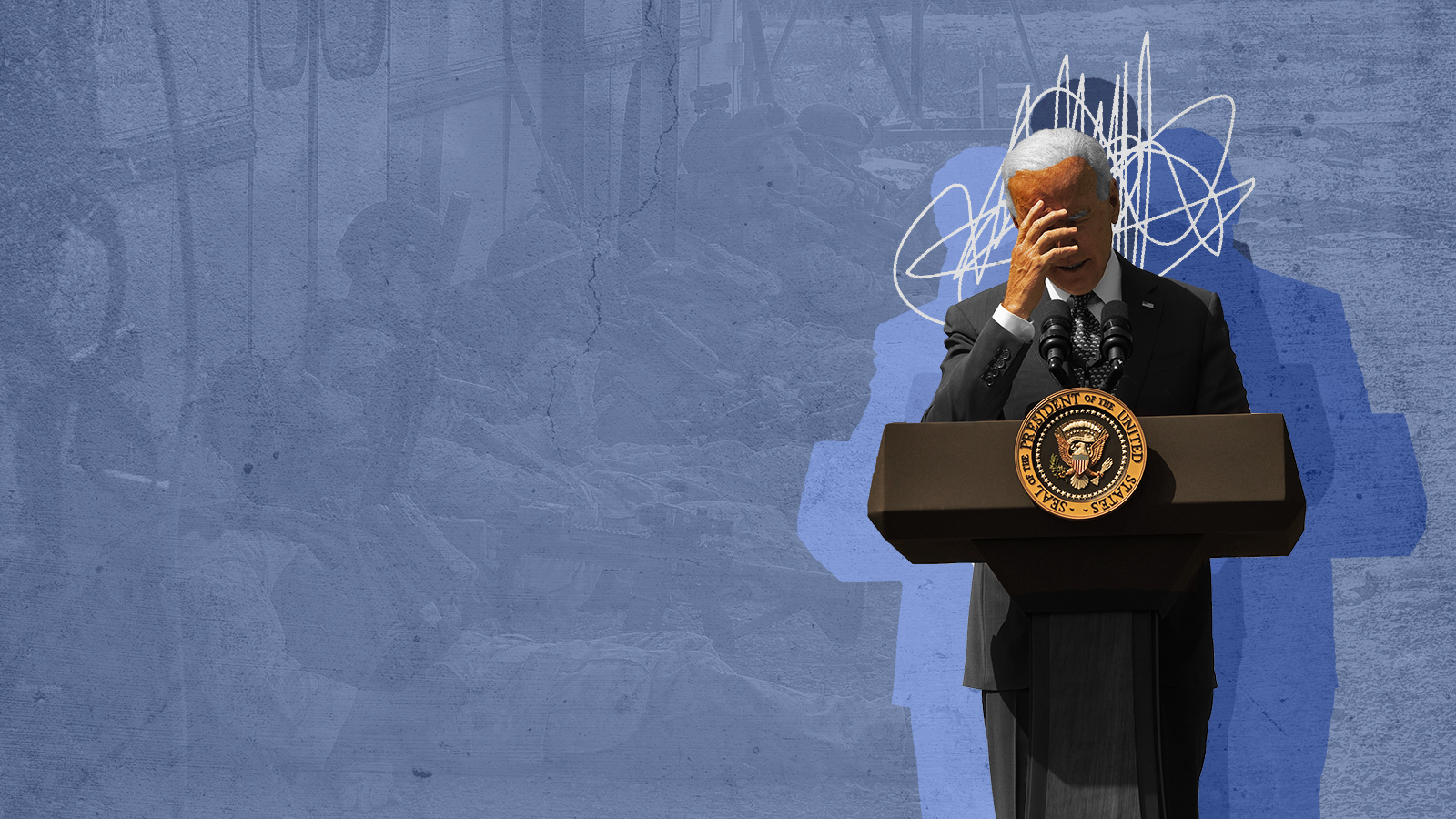Biden fails to explain Kabul chaos


A free daily email with the biggest news stories of the day – and the best features from TheWeek.com
You are now subscribed
Your newsletter sign-up was successful
President Biden returned from Camp David to the White House on Monday to address the nation in the wake of the shocking weekend unraveling of the situation in Afghanistan. Cities rapidly succumbed to the advances of the Taliban, the lavishly funded Afghan national army disintegrated overnight, senior officials in the government fled hastily, and aspiring refugees desperately swarmed the Kabul airport. It looked for all the world as if the U.S. had forgotten to pack up the apartment before the moving truck showed up, with dire consequences for who and what got left behind.
The context for a weary-seeming President Biden's speech today was, therefore, not just the human tragedy of longtime staff, translators and other workers abandoned to the rough justice of the Taliban, but a suddenly acute political problem for the administration. However, if Biden intended to engage in damage control, he failed. "This did unfold more quickly than we anticipated," the president conceded while trying to explain why a massive evacuation effort didn't begin sooner.
Ultimately, the president seemed determined only to reiterate the case for leaving. "I stand squarely behind my decision," he stated. And so he should, but that wasn't his job today. He needed to say why the U.S. military, an unparalleled fighting force, was unable to safely evacuate itself, the Afghans who bravely served the U.S., as well as untold numbers of refugees who wanted to flee the incoming Taliban forces, without the nightmarish scenes broadcast all around the world.
The Week
Escape your echo chamber. Get the facts behind the news, plus analysis from multiple perspectives.

Sign up for The Week's Free Newsletters
From our morning news briefing to a weekly Good News Newsletter, get the best of The Week delivered directly to your inbox.
From our morning news briefing to a weekly Good News Newsletter, get the best of The Week delivered directly to your inbox.
This isn't about "credibility," that most ethereal of currencies. The U.S. had none prior to the collapse of the Afghan government and it has none now. The end of the Afghanistan war was years overdue, and Biden was right to do it. But we owed our allies there an orderly exit and instead we got this. Biden will need to identify and fire the people responsible for the failure as quickly as possible or prepare for weeks of second-guessing and finger-pointing.
A free daily email with the biggest news stories of the day – and the best features from TheWeek.com
David Faris is a professor of political science at Roosevelt University and the author of "It's Time to Fight Dirty: How Democrats Can Build a Lasting Majority in American Politics." He's a frequent contributor to Newsweek and Slate, and his work has appeared in The Washington Post, The New Republic and The Nation, among others.
-
 Political cartoons for February 21
Political cartoons for February 21Cartoons Saturday’s political cartoons include consequences, secrets, and more
-
 Crisis in Cuba: a ‘golden opportunity’ for Washington?
Crisis in Cuba: a ‘golden opportunity’ for Washington?Talking Point The Trump administration is applying the pressure, and with Latin America swinging to the right, Havana is becoming more ‘politically isolated’
-
 5 thoroughly redacted cartoons about Pam Bondi protecting predators
5 thoroughly redacted cartoons about Pam Bondi protecting predatorsCartoons Artists take on the real victim, types of protection, and more
-
 Why is the Trump administration talking about ‘Western civilization’?
Why is the Trump administration talking about ‘Western civilization’?Talking Points Rubio says Europe, US bonded by religion and ancestry
-
 Big-time money squabbles: the conflict over California’s proposed billionaire tax
Big-time money squabbles: the conflict over California’s proposed billionaire taxTalking Points Californians worth more than $1.1 billion would pay a one-time 5% tax
-
 Did Alex Pretti’s killing open a GOP rift on guns?
Did Alex Pretti’s killing open a GOP rift on guns?Talking Points Second Amendment groups push back on the White House narrative
-
 Washington grapples with ICE’s growing footprint — and future
Washington grapples with ICE’s growing footprint — and futureTALKING POINTS The deadly provocations of federal officers in Minnesota have put ICE back in the national spotlight
-
 Trump’s Greenland ambitions push NATO to the edge
Trump’s Greenland ambitions push NATO to the edgeTalking Points The military alliance is facing its worst-ever crisis
-
 Why is Trump threatening defense firms?
Why is Trump threatening defense firms?Talking Points CEO pay and stock buybacks will be restricted
-
 The billionaires’ wealth tax: a catastrophe for California?
The billionaires’ wealth tax: a catastrophe for California?Talking Point Peter Thiel and Larry Page preparing to change state residency
-
 Trump considers giving Ukraine a security guarantee
Trump considers giving Ukraine a security guaranteeTalking Points Zelenskyy says it is a requirement for peace. Will Putin go along?
